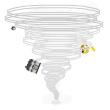Yeah, older users are generally particular about that sort of thing (no offense to your Dad)...
It's just that they lived through the "virus scares" in the early 00's, for lack of a better term, years ago... I suspect your Dad, more than once, had multiple pop up windows (which really wasn't a virus at all, merely a browser exploit) convince him he should be paranoid. Paranoia is fine, but paid AV isn't all that much better (or in the case of Norton and McAfee, generally worse) than just being a safe user.
This is a gross analogy, but it's one I used to use for my CIS101 class (I'm frankly shocked that no one ever complained...)... Think of computers like having...intimate relations...with someone. Everytime you exchange data with an untrusted source, be it a website, a CD, a USB device, etc...your computer is...well...doing the humpty hump.
The more untrusted places you expose your computer too, just like in real physical relations, the more exposure you have to pick something up.
Of course it's far more complex than that, but as a general rule, it works.
As far as your older machine being slow, it could be a variety of things. Start off with downloading ccleaner and running that. IE is integral to the OS, and should be upgraded, but never uninstalled. Chrome (but no longer firefox..firefox has gone down the bloat road lately) is a nice clean browser to use that isn't quite as much a memory hog as IE is, but IE 10 / 11 are both rather clean, so MS has done a good job streamlining the browsers (though, you may run into compatability issues...though, you'll run into that with Chrome as well...but it's rare...also, Chrome has an issue they haven't yet fixed with the Flash plugin, which is annoying, and can cause Chrome to crash randomly).

 MORPHED ANIMALS!
MORPHED ANIMALS!








